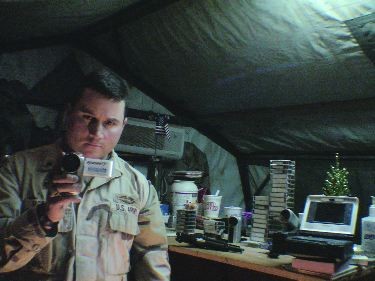Soldiers on tape

In 2004, about a year into Operation Iraqi Freedom, as the insurgency was gathering steam, journalist Deborah Scranton was offered a chance to embed herself with a military company that included members of the New Hampshire National Guard. She declined but made an intriguing counterproposal. She offered to give the soldiers light, mobile video cameras so they could record their experiences.
Scranton and her team received the soldiers’ videos online, edited them, added footage about families and put together a complex sociopolitical mosaic. The War Tapes is an illuminating, disturbing 97-minute documentary that goes beyond its original intent (as most successful documentaries do) by not only showing the precarious existence of soldiers and civilians in Iraq but also burrowing into why soldiers do what they do and how they feel about it.
Approximately ten soldiers shot the footage, using hand-held cameras that could be mounted on helmets, dashboards or gun turrets. Only three of the soldiers play a major on-camera role, documenting the battles, conducting impromptu interviews with fellow soldiers, and turning the cameras on themselves to present a “video diary” of their dangerous and confusing mission.
By the end we get to know Sergeant Stephen Pink, 24, a burgeoning writer who joined the National Guard to earn money for college; Specialist Mike Moriarty, 35, who joined to prove something to his wife, children and himself, and as a gut reaction to September 11; and Sergeant Zack Bazzi, 24, a Lebanese-born Arabic speaker who experienced wars in Bosnia and Kosovo.
Each soldier has a different perspective on the cause of the conflict (freedom, money, oil, power) and on its effects (one suggests that with George Bush’s reelection in 2004 people should start preparing for “Operation Iranian Freedom”).
Moriarty seems the most troubled as he tries to reconcile his patriotism with his anger at the way that private industry (including Dick Cheney’s Halliburton) is profiting from the war. Pink, the most articulate, is able to express his intense feelings through metaphor. His most potent description is comparing a nearly severed hand hanging from a bloody arm to a child’s mitten hanging from a winter coat. Bazzi, the most conflicted, seems able to understand, having lived through the civil war in Lebanon, why many Iraqis are not happy about the U.S. presence. His political observations also seem the most acute, including the memorable line, “A good American will always love his country—and be suspicious of his government.”
It’s clear from the tone of the editing (which includes participation by Steve James of Hoop Dreams fame) that Scranton is not a fan of the war. But she does not exclude moments when the soldiers express their sense of duty, pride, honor and global responsibility even as they grumble about the hellhole they have been cast into.
This record of daily life includes the regular explosion of roadside bombs, bursts of gunfire out of nowhere, and the hunting down and killing of a pair of snipers, their bodies blown to bits by the force of U.S. weaponry. The overall impression is one of chaos. Men unprepared for such a conflict alternate between a sense of compassion for the Iraqis and raw expressions of racism. One of the most moving sequences involves a young Iraqi mother who is killed as she tries to cross a busy military highway.
The soldiers’ families play a pivotal role. Bazzi’s Lebanese mother bemoans the fact that the family barely escaped one war and now her son is participating in another. Pink’s girlfriend is forced to grow up and face some hard truths. Moriarty’s loving and patient wife understands her husband’s need to prove himself under fire, but worries about her two small children.
The War Tapes is not an extensive examination of the complexities of the Iraq war. It offers a corner of the truth and a glimpse of moral quandaries that are not pleasant to face. Sergeant Bazzi observes, “I love being a soldier. The only bad thing about the army is that you can’t pick your war.”





